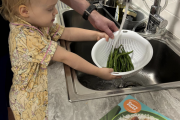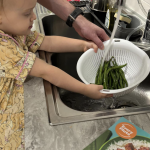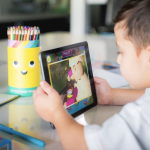My Daughter Speaks a Different Language to Me
![]()
Image source
For the last year, I’ve been struggling to reduce the distance that’s been growing between my daughter and I. She is only 4 and a half, and our ongoing battles are enough to reduce my behavioural age to that of a toddler. I can see in her eyes that I’m losing her.
I want to be a good mother, and to have a strong relationship with her, but until recently I didn’t have the insight or parenting skills to know what to do to heal our relationship and make it grow.
Despite a lot of parental discussion, I’ve had no luck with strategies. Despite a small library of parenting books, I’ve had no helpful answers. Until recently, when I finally found what I was looking for.
I stole a weekend away from my children to spend a solid 24 hours with a girlfriend. Her own girls were older, and I had always seen how hard she worked building bonds and relationships with her kids. Instead of just casually talking about my problem, as we’d normally do, I asked her to help me seriously. I told her, “I’m losing my daughter and I’m scared I won’t be able to get her back.” And she knew exactly what I meant. She said that family relationships had to be worked on all the time, and not to take any of them for granted just because they’re kids. The tanks will run dry, sooner or later.
So we started to talk. She asked me about my daughter, at length. Who is she? What does she like to do, to eat, to sing, to play? What angers her? What thrills her? What does she talk about incessently? How does she behave in various situations. She asked me all the same questions. By analysing our different personalities and behaviours, my friend discovered that my daughter and I both speak a different language, and that neither of us can understand what the other is saying.
And then she brought out a book called the ‘5 Love Languages of Children’ by Gary Chapman and Ross Campbell.
I was familiar with the concept, having read the original 5 Love Languages for adults by Gary Chapman years earlier to help me in my marriage. When the kids came along, however, I forgot to include them in that sphere of understanding. I rightly gave my babies pure and unconditional love – meeting ALL their needs, talking all 5 love languages with them, which is what babies need to fill their cups.
Somewhere along the line, I was supposed to change, staying in tune with their growing personalities and needs. I wish someone had told me that earlier! It’s the opposite of “treating all others as you would like to be treated”.
![]()
Everyone is different when it comes to love and how they like to give and receive it. As babies get older, they’ll start to show different tendencies for preferred actions. The 5 love languages described in this book are Touch, Acts of Service, Quality Time, Gifts and Affirmations. Your children will polarise more heavily towards one or two of them than the others, as will you.
I love to touch and be touched – long, strong hugs – physical connection with eye contact. Quality Time is next on my list – time spent making cards, writing letters, painting pictures, talking, hanging out. Time with other adults is what fills my tank right now. Not my child, who drains my reserves with her behaviour.
My daughter’s love languages are Acts of Service and also Quality Time with people she loves. She wants help with things and equally likes to help others with tasks. She cares for people when they hurt themselves, and equally, wants a bandaid when she has a small scratch.
She desperately wants me to spend time with her and I desperately want her to become more independent, so I can get some time for my own needs. My daughter’s need for quality time with me is overridden by my need for quality time with other grownups.
“Stop interrupting me when I’m speaking to another grownup!” and “Why can’t you play with the other children in the park? This is Mummy’s time to see her friends!” are regular outbursts from yours truly. When she whinges that I won’t help her with tasks, I get cross because I know she is capable of doing them herself.
Concurrently, I show her that I love her by wanting cuddles and stroking her hair (WRONG) – she’s not a fan of my love language and she’s tried to tell me. Hates me tucking her hair behind her ears, which I do complusively. She likes a three second hug when I would have a ten minute one. Just like her Dad.
Our love languages have been cancelling each other out and together, our tanks are always running low.
But now I know what language she’s speaking, I’ve started to translate. I’ve written a chart for each member of my family outlining what we all need to keep our tanks full. I now have a huge arsenal of things to do to help my relationships improve. And do you know what, it really works.
I don’t scoff at small wounds – I comfort and plaster. In return, she hugs me for longer, instinctively knowing what I crave. I help her with her buttons, and cleaning her room. She helps me with small tasks in return and gives me uninterrupted time to call my Mum because her tank is filling. I hold her close when she’s having a tantrum, instead of stropping off like I’m five years old, expecting her to know how to calm herself down. I lie with her in bed sometimes when I would normally expect her to self-soothe to sleep. I even gave her breakfast in bed the other day, for the very first time ever, and she hasn’t stopped talking about it!
I am finally listening to my child’s language and she’s hearing mine too. It’s a beautiful thing and I would encourage all parents to read this book, make charts of your own for each member of your immediate family and practice loving each of them in the way they need. You will get it back in spades, my friends, in spades.
My little girl and I have finally discovered each other and it wasn’t too late.
It’s never too late.
A nurse and counsellor by trade, Caylie Jeffery has had many adventures and experiences that have made her into a strong, independent, and interested woman. Being a mindful parent in a world that loves to turn children into mindless robots is her biggest challenge yet, and she is determined to instil passion about life, books, art and people into their hearts and minds.
Caylie has a blog where she writes familiar essays about subjects that catch her breath. She is establishing herself as a freelance writer, and is an emerging author of children’s stories, teen adventures and creative adult non-fiction.










